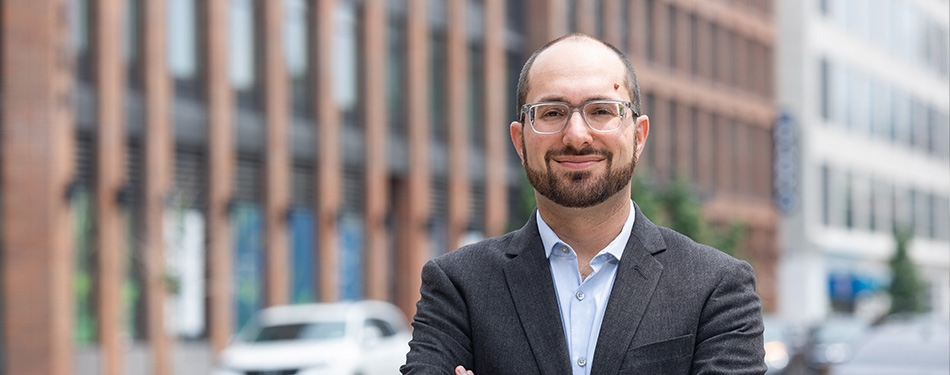Noah Kazis brings his legal background in local government and private research to Michigan Law.
Noah Kazis was poised to pivot into a teaching career at a major university after practicing law in-house at the New York City Law Department and spearheading research projects at New York University’s Furman Center for Real Estate and Urban Policy.
His opportunity to enter academia materialized this year when he joined the faculty of the University of Michigan Law School as an assistant professor of law.
When the fall term begins, Kazis will leverage his professional experience in the public sector and share his in-depth legal knowledge of key areas such as local government law and land use with Michigan Law students.
Cities are places where we can try out innovative policies and programs. They can be the real laboratories of democracy.
Kazis’s decision to leave the East Coast and settle in the Midwest was influenced by the reputation for excellence that characterizes the University of Michigan and its law school, as well as the culturally rich, family-friendly vibe in Ann Arbor.
“I’m excited about my new teaching position,” Kazis said. “Michigan Law and its faculty are world-class. This is an institution where people are kind yet serious in their commitment to pursuing scholarship, training good lawyers, and understanding and improving the law.”
Working on “hot button issues” like sanctuary cities, voting rights, climate change
Kazis has been interested in local government and its vital role in communities at least since he picked up a copy of Jane Jacobs’ book The Death and Life of Great American Cities in high school.
“To a high schooler, the book was eye opening and life changing,” he recalled. “This was how I wanted to think about the world.”
After completing his law degree at Yale Law School in 2015 and serving as a law clerk for two members of the judiciary, Kazis joined the New York City Law Department in 2017 where he became a Corporation Counsel Honors Fellow and, later, assistant corporation counsel.
He describes his work for the next two years as being on the “cutting edge of public policy.” Kazis tackled “the hottest button issues of the day,” including sanctuary-city policies, voting rights, and climate legislation limiting greenhouse gas emissions from buildings.
But he was struck by the breadth and depth of local government’s legal involvement in bread-and-butter issues such as land use, housing, schools, police, and municipal services that touch the everyday lives of citizens.
“Being part of that big endeavor of self-government at the local level was really exciting for me,” Kazis said. “It was a combination of keeping the huge machinery of local government running but at the same time attempting to build something new.
“Cities are places where we can try out innovative policies and programs,” he added. “They can be the real laboratories of democracy.”
In 2019, Kazis became a legal fellow at the Furman Center, where he deepened his understanding of federal housing policies and land use issues. He also experienced a sense of personal fulfillment by working closely with university students who were seeing things in a new way for the first time.
“I was able to conduct rigorous but also policy-relevant research with the students,” Kazis said.
His research engaged directly with New York state and local governments on issues such as exclusionary zoning in the New York suburbs and repurposing commercial space that was vacated during the pandemic.
Training future lawyers on the importance of understanding local government
Kazis expects his research focus to shift in exciting and important new ways once he settles in at Michigan Law and learns the “unique context” of the state of Michigan, the Metro Detroit area, and Ann Arbor.
“I conducted my prior research in ‘super-star cities’ dealing with the problems associated with regions with incredible wealth and, on the aggregate level, booming job markets,” Kazis said. “The state of Michigan is dealing with deindustrialization, disinvestment, and decline in some places, so I will have a different set of questions to think through.”
Whether the setting is New York or Detroit, however, an in-depth knowledge of local government is essential for anyone who wants to practice law, according to Kazis.
“Local government is involved in absolutely every piece of our system of government, and understanding how our cities and counties work is a critical skill for becoming a great lawyer,” he said. “I hope to prepare Michigan Law students to get involved in local government forums both as lawyers and as citizens in ways that are thoughtful, effective, and responsible.”
—Claudia Capos

